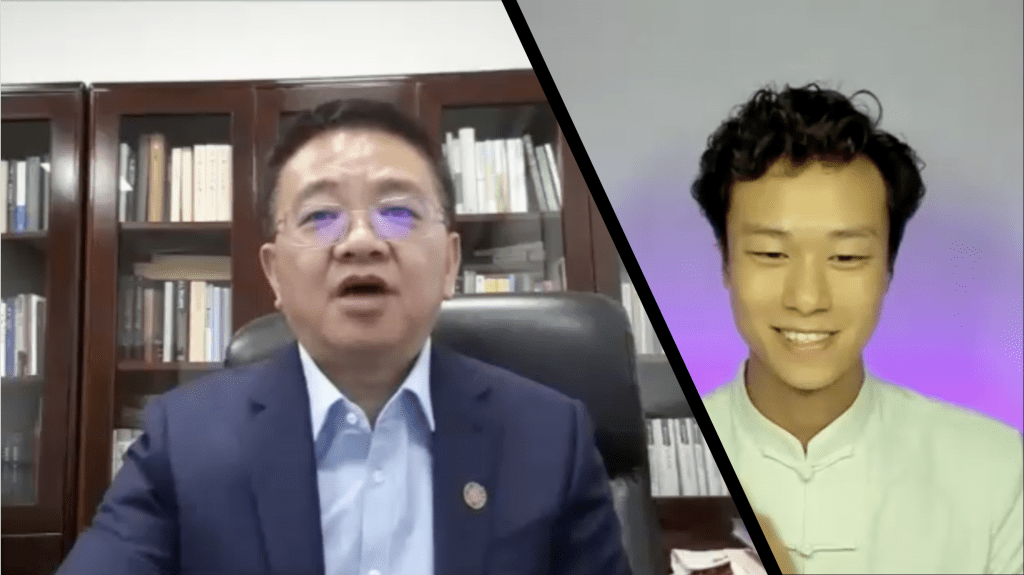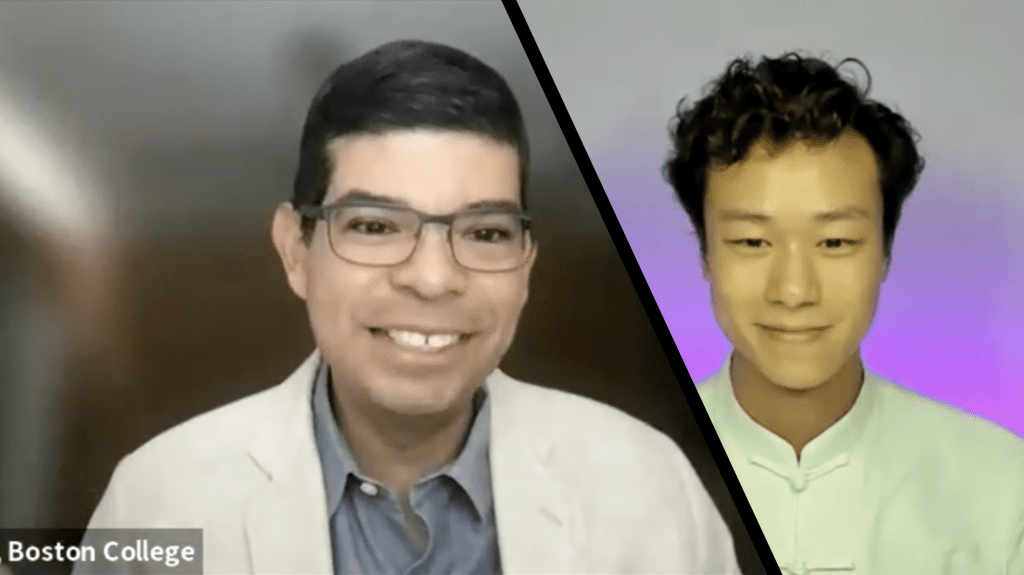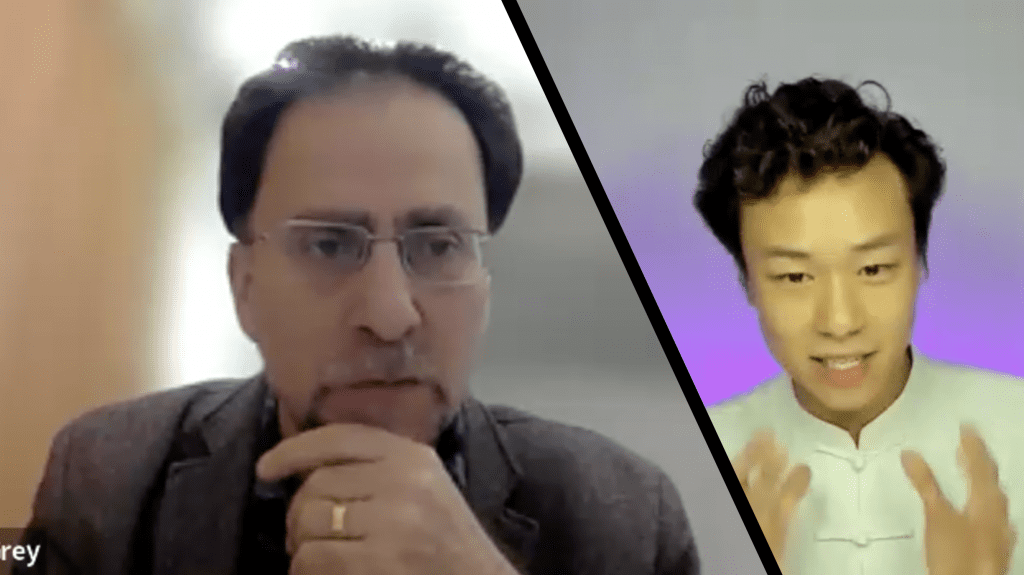The first session of the 2023 Online Education Dialogue (OED) with the theme “Navigating Al-Driven Digital Transformation in Higher Education” was successfully held on May 17th. Co-hosted by the Global MOOC and Online Education Alliance (GMA), Tsinghua University, XuetangX and UNESCO International Centre for Engineering Education (ICEE), the theme of the first dialogue was “Unraveling and Embracing Al in Higher Education: Practices · Opportunities · Challenges · Future”.
Peng Gang, the Vice President and Provost of Tsinghua University and Chair of the Executive Committee of the Global MOOC and Online Education Alliance delivered the opening remarks. Gerardo L. Blanco, Associate Professor of Higher Education and Academic Director at Center for International Higher Education at Boston College, Francois Grey, professor at Information Science Institute of the University of Geneva and Director of the Geneva-Tsinghua Initiative, Wang Qiyun, Tenured Associate Professor of the Academic Group of Learning Science and Assessment (LSA) at National lnstitute of Education (NIE) of Nanyang Technological University (NTU) in Singapore, and Xu Luping, Associate professor and Vice Dean of Xingjian College of Tsinghua University were invited for the keynote speech and panel discussion.
This dialogue aimed to share insights and practical experience in the development of AI-empowered higher education, promoting the AI-driven digital transformation of higher education.

In the opening remarks, Peng Gang pointed out that world-leading universities and platforms have always played an extremely important role in the digital transformation of higher education. The Global MOOC and Online Education Alliance has been dedicated to gathering the strengths of leading universities and platforms around the world, establishing a diverse community dedicated to promoting the development of high-quality MOOCs and online education, promoting international bilateral and multilateral cooperation and exchange in education technology and innovation, encouraging all members to set examples and contribute to the achievement of the United Nations Sustainable Development Goals. In the face of the rapid development of AI technology, higher education practitioners should adapt to the development trend and make necessary preparations to cope with the challenges and seize the opportunities that higher education faces in the AI era. They should also think about how AI could improve teaching quality, and achieve efficient management and scientific governance in higher education. Additionally, he called on global universities to join hands to promote the high-quality development of higher education in the era of AI.
Four professors shared their thoughts on higher education development in the AI era in the keynote speech. Professor Gerardo L. Blanco stated that with artificial intelligence, educators could automate the most mundane elements and focus on the most important aspects of mentoring. AI has brought disruptive changes to student evaluation. Educators must orient assessment to higher-order thinking, which is authentic assessment. AI can also generate hallucinations. To deal with this problem, higher-order thinking, often called critical and creative thinking, has become increasingly important.
Professor Francois Grey pointed out that the biggest challenge for applied AI researchers and students is getting high-quality data. He mentioned the focus on citizen science or citizen-generated data and demonstrated some data collection and processing platforms and tools. Apart from collecting and processing high-quality data, AI can promote higher education in less-developed regions. These intelligent AI chatbots, which can tutor students, are incredibly supportive when students have very little chance of having personal tutoring from a teacher.
Professor Wang Qiyun claimed that AI is a very useful tool for personalized learning. It can be used as a “teaching agent”, a “peer agent”, a “teachable agent” and a “motivational agent”. However, AI also brings some challenges including bias, lack of transparency, invasion of privacy and ethical issues. Users need to pay attention to data sources and data protection. NTU has issued a guideline for AI tools such as ChatGPT for students. AI tools are generally accepted and allowed by the university, but students are reminded of their challenges and pitfalls.
Professor Xu Luping pointed out that artificial intelligence cannot substitute for human discovery and the defining of problems. Therefore, higher education’s focus should be shifted from cultivating more problem solvers to problem definers. By using AI algorithms, students, teachers, and researchers will be able to find each other much more easily, building a global community of innovative learners. Global educators must always get connected and consider how to guide the youth to use AI properly, especially if they are destined to solve innovative problems.
During the roundtable discussion, Professor Wang Qiyun pointed out that AI can provide personalized suggestions for students based on big data collected in the learning management system. Professor Blanco stated that educators should pay attention to students’ learning processes and critical thinking, focusing on how they draw conclusions. Professor Grey called on young people to actively participate in discussions and produce creative thoughts for setting up guidelines for AI’s future. Professor Xu Luping mentioned that AI’s super powerful computational capacity replaces previously simplified analysis methods and helps researchers conduct more complex and in-depth studies.

This dialogue was hosted by Enoch Wong, Senior Advisor (Online Education & International Cooperation) and Global Communication Ambassador at Tsinghua University. The bilingual live broadcast in both Chinese and English was provided by XuetangX for global viewers and has been turned into a MOOC for audiences around the world to watch. It has been viewed approximately 2,000 times globally.
For more information, check out the Concept Note of the Online Education Dialogue (OED) 2023. If you are interested to share your insights and contribute to this very important conversation on “Navigating Al-Driven Digital Transformation in Higher Education”, please do not hesitate to contact the dialogue host, Enoch Wong, at [email protected]



